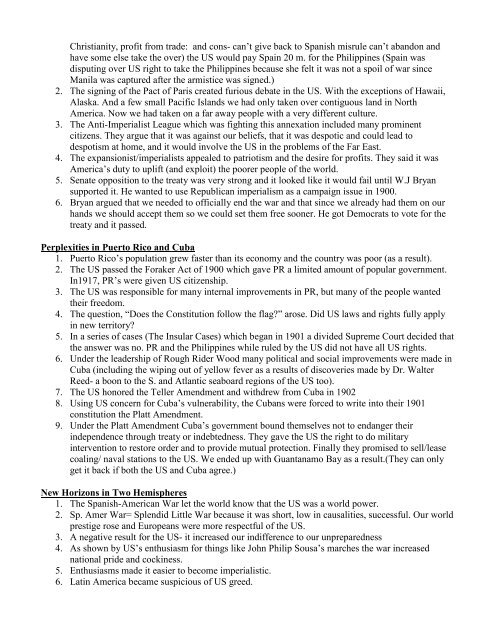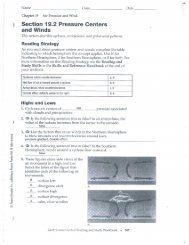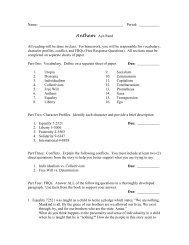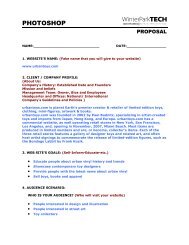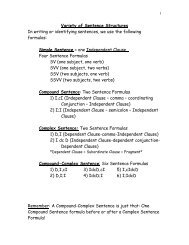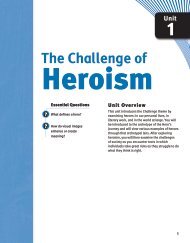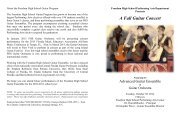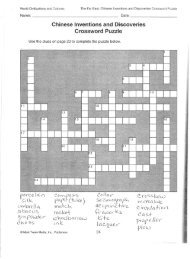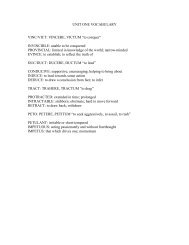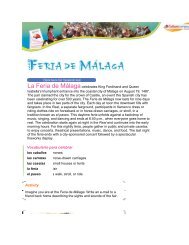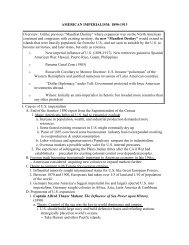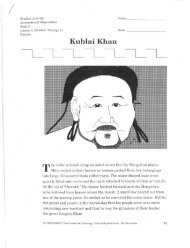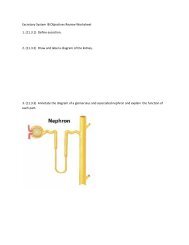Chapter 27 Empire and Expansion, 1890-1909 In the years after the ...
Chapter 27 Empire and Expansion, 1890-1909 In the years after the ...
Chapter 27 Empire and Expansion, 1890-1909 In the years after the ...
Create successful ePaper yourself
Turn your PDF publications into a flip-book with our unique Google optimized e-Paper software.
Christianity, profit from trade: <strong>and</strong> cons- can’t give back to Spanish misrule can’t ab<strong>and</strong>on <strong>and</strong><br />
have some else take <strong>the</strong> over) <strong>the</strong> US would pay Spain 20 m. for <strong>the</strong> Philippines (Spain was<br />
disputing over US right to take <strong>the</strong> Philippines because she felt it was not a spoil of war since<br />
Manila was captured <strong>after</strong> <strong>the</strong> armistice was signed.)<br />
2. The signing of <strong>the</strong> Pact of Paris created furious debate in <strong>the</strong> US. With <strong>the</strong> exceptions of Hawaii,<br />
Alaska. And a few small Pacific Isl<strong>and</strong>s we had only taken over contiguous l<strong>and</strong> in North<br />
America. Now we had taken on a far away people with a very different culture.<br />
3. The Anti-Imperialist League which was fighting this annexation included many prominent<br />
citizens. They argue that it was against our beliefs, that it was despotic <strong>and</strong> could lead to<br />
despotism at home, <strong>and</strong> it would involve <strong>the</strong> US in <strong>the</strong> problems of <strong>the</strong> Far East.<br />
4. The expansionist/imperialists appealed to patriotism <strong>and</strong> <strong>the</strong> desire for profits. They said it was<br />
America’s duty to uplift (<strong>and</strong> exploit) <strong>the</strong> poorer people of <strong>the</strong> world.<br />
5. Senate opposition to <strong>the</strong> treaty was very strong <strong>and</strong> it looked like it would fail until W.J Bryan<br />
supported it. He wanted to use Republican imperialism as a campaign issue in 1900.<br />
6. Bryan argued that we needed to officially end <strong>the</strong> war <strong>and</strong> that since we already had <strong>the</strong>m on our<br />
h<strong>and</strong>s we should accept <strong>the</strong>m so we could set <strong>the</strong>m free sooner. He got Democrats to vote for <strong>the</strong><br />
treaty <strong>and</strong> it passed.<br />
Perplexities in Puerto Rico <strong>and</strong> Cuba<br />
1. Puerto Rico’s population grew faster than its economy <strong>and</strong> <strong>the</strong> country was poor (as a result).<br />
2. The US passed <strong>the</strong> Foraker Act of 1900 which gave PR a limited amount of popular government.<br />
<strong>In</strong>1917, PR’s were given US citizenship.<br />
3. The US was responsible for many internal improvements in PR, but many of <strong>the</strong> people wanted<br />
<strong>the</strong>ir freedom.<br />
4. The question, “Does <strong>the</strong> Constitution follow <strong>the</strong> flag?” arose. Did US laws <strong>and</strong> rights fully apply<br />
in new territory?<br />
5. <strong>In</strong> a series of cases (The <strong>In</strong>sular Cases) which began in 1901 a divided Supreme Court decided that<br />
<strong>the</strong> answer was no. PR <strong>and</strong> <strong>the</strong> Philippines while ruled by <strong>the</strong> US did not have all US rights.<br />
6. Under <strong>the</strong> leadership of Rough Rider Wood many political <strong>and</strong> social improvements were made in<br />
Cuba (including <strong>the</strong> wiping out of yellow fever as a results of discoveries made by Dr. Walter<br />
Reed- a boon to <strong>the</strong> S. <strong>and</strong> Atlantic seaboard regions of <strong>the</strong> US too).<br />
7. The US honored <strong>the</strong> Teller Amendment <strong>and</strong> withdrew from Cuba in 1902<br />
8. Using US concern for Cuba’s vulnerability, <strong>the</strong> Cubans were forced to write into <strong>the</strong>ir 1901<br />
constitution <strong>the</strong> Platt Amendment.<br />
9. Under <strong>the</strong> Platt Amendment Cuba’s government bound <strong>the</strong>mselves not to endanger <strong>the</strong>ir<br />
independence through treaty or indebtedness. They gave <strong>the</strong> US <strong>the</strong> right to do military<br />
intervention to restore order <strong>and</strong> to provide mutual protection. Finally <strong>the</strong>y promised to sell/lease<br />
coaling/ naval stations to <strong>the</strong> US. We ended up with Guantanamo Bay as a result.(They can only<br />
get it back if both <strong>the</strong> US <strong>and</strong> Cuba agree.)<br />
New Horizons in Two Hemispheres<br />
1. The Spanish-American War let <strong>the</strong> world know that <strong>the</strong> US was a world power.<br />
2. Sp. Amer War= Splendid Little War because it was short, low in causalities, successful. Our world<br />
prestige rose <strong>and</strong> Europeans were more respectful of <strong>the</strong> US.<br />
3. A negative result for <strong>the</strong> US- it increased our indifference to our unpreparedness<br />
4. As shown by US’s enthusiasm for things like John Philip Sousa’s marches <strong>the</strong> war increased<br />
national pride <strong>and</strong> cockiness.<br />
5. Enthusiasms made it easier to become imperialistic.<br />
6. Latin America became suspicious of US greed.


